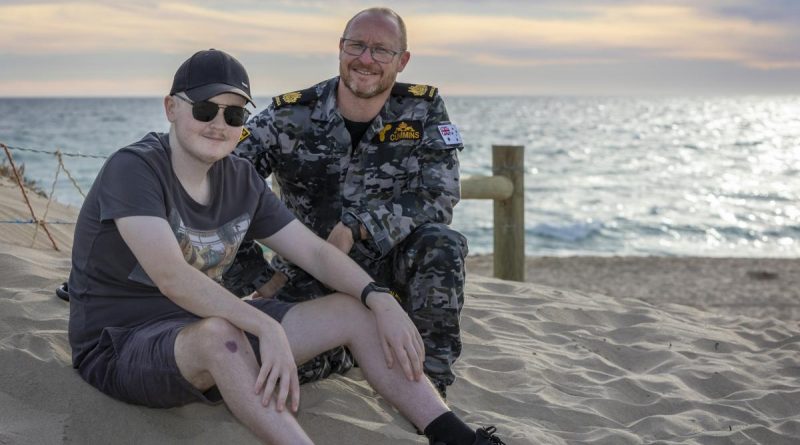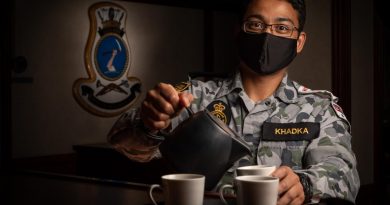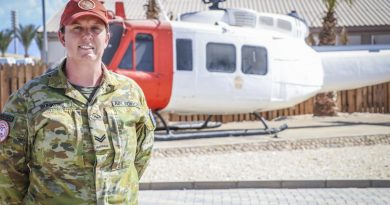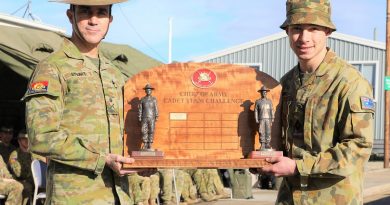Cancer battle motivates marathon effort

Instead of hanging out with mates and playing sport, at 16, Jack Cummins was fighting for his life in hospital.
CAPTION: Warrant Officer Tim Cummins with his son, Jack, at Ship Wreck Bay in Golden Bay, Western Australia. Story by Petty Office Lee-Anne Cooper. Photo by Petty Officer Yuri Ramsey.
He had suffered headaches, which led to doctors discovering cancer growing inside his skull.
He soon couldn’t walk, lost his fine motor skills, and most of his friends could not deal with being confronted by his condition.
It was 2019 and Jack was diagnosed with medulloblastoma, a type of brain cancer.
Jack’s father, Warrant Officer Tim Cummins, and five other submariners are banding together to raise money for brain cancer research by completing a 19.7km swim from Fremantle to Rottnest Island in Western Australia on March 19.
The team has already raised more than $12,000 of the $50,000 goal for the Pirate Ship Foundation.
“[Jack] was 16 years old and was suffering with headaches that we thought was probably ATAR stress,” Warrant Officer Cummins said.
Away on an interstate course at the time, Warrant Officer Cummins was on the next flight home after his wife, Dee, rang with the news.
Jack underwent emergency surgery to remove a 5cm tumour the next morning.
Jack’s family was told that if the cancer was left untreated, he would have died in less than six weeks.
“The swim was an opportunity to get together as a team and give something back,” team member Petty Officer Steven Merritt said.
Submariners are a close-knit group and when they approached then-commander Sea Training Group – Submarines, Commander Darren White, for permission to undertake this charitable event, he said “what are we waiting for?”.
Commander White is assisting the team as the paddler, guiding swimmers to make sure they are okay.
The team have been training hard in the lead-up and are confident they will do Jack proud.
“Jack is my hero,” Warrant Officer Cummins said.
“The skipper has arranged another vessel to take families over to Rottnest. It will be a very emotional day.”
Warrant Officer Cummins is not the only member of the group with a personal connection to cancer.
Petty Officer Mark Lindo’s son, Callum, was diagnosed with medulloblastoma, 12-months before Jack.
Childhood brain cancer kills more Australian children than any other disease.
Tumours of the central nervous system – mainly brain tumours – account for the largest number of cancer deaths for children in Australia, at 39 per cent according to the Cancer Council.
Treatments for the disease are surgery, radiation therapy and chemotherapy.
While treatments are effective, they often cause lifelong disabilities such as paralysis, strokes and neurocognitive defects.
“The treatment plan has not changed in 30 years – and, therefore, neither has the survival rate,” Warrant Officer Cummins said.
“Further, if a child relapses, there are currently no further treatment options.”
Even in the most fortunate cases, treatments are so damaging to a developing brain that they leave irreversible and lifelong side effects.
“They told us that Jack would never walk again, but he has proven them wrong,” Warrant Officer Cummins said.
“He has spent a year of intensive rehabilitation. We still have to be around him in case he loses his balance but, at home, he is beginning to walk unaided.
“Jack will never be able to do long distances but he will be able to go to the shops, restaurants, work and things like that.”
For more information go to shoutforgood.com/fundraisers/jollyrogers22.
.
.

.
.





